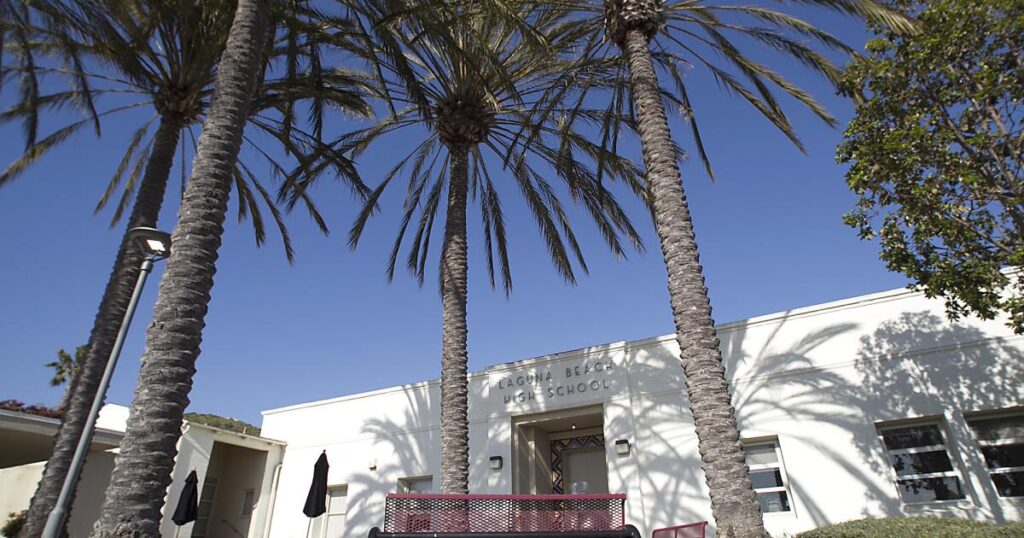Administrators at Laguna Beach High School have launched an investigation after a student allegedly used artificial intelligence to create and circulate “inappropriate images” of other students.
It’s unclear how many students are involved in the scam, specifically what photos exist or how they were distributed.
In a March 25 email to parents, Principal Jason Alleman wrote that school leadership is “taking steps to investigate this matter and address it directly with those involved, while making this situation clear to our students.” Using it as a teachable moment, reinforcing the importance of responsible behavior and mutual respect.”
The Laguna Beach Police Department is assisting in the investigation, but a department spokeswoman declined to provide any details about the investigation because the people involved are juveniles.
An Orange County high school joins a growing number of educational institutions grappling with the use of artificial intelligence in the classroom and social environment.
In schools across the country, people have used deepfake technology to combine real photos of female students with fake photos of naked bodies. Deepfake photos can be taken with a cell phone.
Last month, five Beverly Hills eighth-graders were expelled for allegedly creating and sharing fake nude photos of their classmates. The students superimposed images of their classmates’ faces onto simulated nude bodies created by artificial intelligence. In all, 16 eighth-graders were targeted by the photos, which were shared through messaging apps, according to the district.
A 16-year-old high school student in Calabasas said a former friend used AI to create pornographic images of her and circulate them, KABC-TV reported last month.
It’s not just teenagers who are being targeted by AI-generated images. In January, AI-generated sexually explicit images of Taylor Swift were shared on social media. The situation prompted outraged fans to call on lawmakers to enact legislation to protect against the creation and sharing of deepfake images.
“It’s a very challenging space and technological advances and capabilities are happening at a very fast pace, which makes it more difficult to wrap your head around,” said Amy Mitchell, director of the Center for News, Technology and Executive Director. Innovation, a Policy Research Center.
Several federal bills have been proposed, including the Preventing Deepfakes of Intimate Images Act, which would make it illegal to create and share AI-generated sexually explicit content without the consent of the subjects. will give. The Disrupt Explicit Forged Images and Non-consensual Edits, or DEFIANCE Act, which was introduced this year, would allow victims to sue the creators of deepfakes if they know the victim did not consent to their creation. Is.
In California, state lawmakers have proposed extending laws banning revenge porn and child pornography to include computer-generated images.
School districts are also trying to get a handle on technology. This year, the Orange County Department of Education began leading monthly meetings with school districts to discuss the use of AI and how to integrate it into the education system.
But the problem of manipulation like the images circulating at Laguna Beach High School is getting worse as technology becomes more popular and easier to use, according to experts.
Artificial intelligence, particularly creative AI, is moving faster than society can responsibly absorb it, said Cindy Howson, chief data strategy officer at technology company ThoughtSpot.
“The world is on a learning curve for creative AI and it’s moving so fast that we can’t just leave it to regulators, AI makers or the schools themselves,” he said.
Parents, school districts, government and creators of AI platforms each have a role to play in implementing safeguards, Husson said. In the meantime, she advises parents to monitor what apps their kids are using and communicate with them about how this technology can be used and misused.
Artificial intelligence technology with the widespread use of social media among teenagers who may not fully understand its consequences, said Sherry Morgan, a Laguna Beach resident whose daughter Attends Laguna Beach High School.
“I think the social media that’s out there today adds to this false sense of what you need, what you want, what you should look like, and how people perceive you. Should go.” “We talk a lot to our kids about the impact of technology and social media and getting lost in the distractions, but it’s a challenge.”
In Laguna Beach, district officials have not detailed the possible disciplinary options administrators are considering. Each incident is “handled on a case-by-case basis, taking into account the individual circumstances of the situation,” the district said in a statement.
The high school, which has an enrollment of more than 1,000 students, plans to host panel discussions on AI-generated content for students during the school day. The panel will include school resource officers, counselors, psychologists and digital media and library specialists, Alleman wrote in a follow-up email to parents Friday.
“In our small community, these events can have far-reaching effects on our campus culture,” Alleman wrote. “These actions not only compromise individual dignity, but also undermine the positive and supportive environment we aim to foster at LBHS.”
